Curt Geda & James Tucker | 75 mins | download (HD) | 16:9 | USA / English | 12

Received wisdom is that while DC comics adaptations are floundering on the big screen (because $3.1 billion from four movies is such a failure), they’re flourishing on the small one, with their ever-growing Arrowverse suite of shows a huge success on the US’s CW network. So named because it began with Arrow in 2012, said ‘verse now also encompasses The Flash, DC’s Legends of Tomorrow, and Supergirl. As well as these main shows, they’ve produced a couple of animated spin-offs for their online platform. The first of these was Vixen, which has so far produced two seasons of six five-minute episodes. Here, those two runs are combined with about 15 minutes of extra bridging material to produced a movie.
The titular Vixen is Mari McCabe (voiced by Megalyn Echikunwoke), who discovers that her family-heirloom necklace has the ability to grant her the power of any animal — so she can run like a cheetah, climb like a spider, stomp like an elephant, fly like an eagle, etc, ad infinitum. While contending with these new skills, she’s also accosted by superheroes Arrow and the Flash (Stephen Amell and Grant Gustin respectively, reprising their roles from the live-action shows), and has to battle with, first, Kuasa (Anika Noni Rose) trying to claim the necklace for herself, and then Eshu (Hakeem Kae-Kazim) trying to, er, claim the necklace for himself…
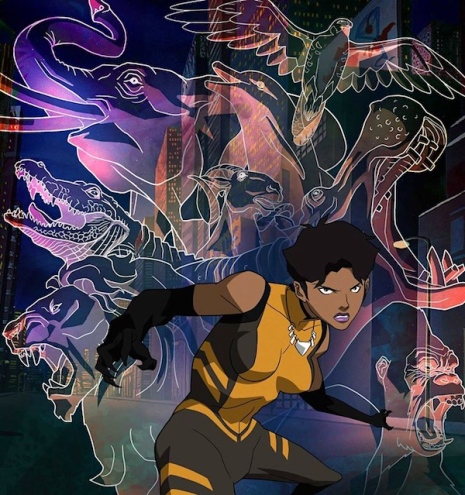
Firstly, it must be said that it’s really obvious Vixen consists of multiple episodes and seasons stitched together. It’s probably not so bad on the episodic level — me being me, I was watching out for where the breaks likely fell in the original five-minute-ish format — but it’s undeniable that it wraps up its first story in about half-an-hour, then moves on to a new story that lasts about 15 minutes, before finally telling another half-hour tale. It feels a bit like watching a movie and its sequel back-to-back, with a related aside in the middle, though in this case each ‘movie’ is the length of an animated TV episode. So, releasing it as Vixen: The Movie was perhaps a bit silly and/or disingenuous. It doesn’t desperately need to retain its original short form, but putting it out as two half-hours — with the added value of a bonus mini-episode containing that bridging story — might’ve felt more satisfactory.
Putting issues of form and presentation aside, the story — or, unavoidably, stories — are alright. The first has the shape of a pretty standard superhero origin story, given some added flavour thanks to the character’s African roots and the relationship with the villain. The short linking part feels like a run-of-the-mill episode of any superhero cartoon series. Apparently some fans complained that Vixen had mysteriously learnt to use her powers between the end of season one and start of season two, so this section attempts to address that point. The final section, as alluded to above, feels like a sequel, with a new primary antagonist but still carrying over threads and points from the first. It goes a bit awry the longer it goes on, with some very for-the-sake-of-it random cameos from the live-action shows, and a disappearance of internal logic during the climax.
At times its own format works against it: Mari says she has no identity and needs to find one, but the narrative doesn’t have enough room to let her. It probably would have if Vixen originated as a 70-minute movie, but in the form of five-minute episodes, which need to use their limited space to fulfil fan expectations of things like action sequences, there’s little to no room for genuine character development. The overall quality is often a bit cheesy and blunt — again, in part to make it satisfying for viewing in five-minute bursts, no doubt, but it does also feel in keeping with the overall style and tone of the Arrowverse.
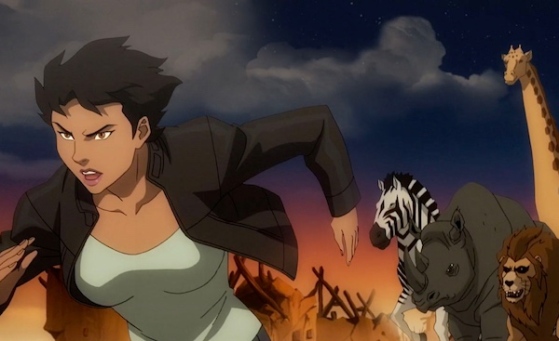
The animation itself is relatively cheap and basic — on a par with the lower end of Warner’s other direct-to-DVD DC animations; probably even a bit simpler. It’s not bad, but no one’s likely to be impressed. That said, when they pop in for cameos, the likenesses of the live-action actors is shit. On the bright side, they’ve used the animated format to create powers and action sequences that would require expensive CGI in a live-action show. These days they can manage that kind of thing, of course (Vixen eventually turned up in an episode of Arrow, in fact, and a version of the character is now a regular on Legends), and you can believe Vixen’s first season wouldn’t’ve been a huge problem for one of the live-action shows. The second season, perhaps as a result of that, goes more all-in on the effects-y action.
Fans of any or all of the other Arrowverse shows may well find something to enjoy in Vixen. Otherwise, it’s newcomer-friendly (aside from those cameos it’s fundamentally standalone) but I doubt it would do much to persuade the uninitiated that they’re missing out.

The Arrowverse returns to UK screens this week, with new episodes of Supergirl on Mondays, The Flash on Tuesdays, DC’s Legends of Tomorrow on Wednesdays, and Arrow on Thursdays. That’ll certainly keep you busy (if you let it).
























 Comedies about superheroes tend to come in the form of big-bucks mainstream-aimed effects-y pieces (
Comedies about superheroes tend to come in the form of big-bucks mainstream-aimed effects-y pieces ( though, because the conceit is all but dropped fairly early on, and the film begins to develop in nice directions. It starts out as pure comedy, and while it doesn’t lose that aspect, it does develop a strand of endearingly genuine sweetness. That helps to see it through the predictable rom-com beats that follow, leaving you (or this viewer, at least) not minding that it’s predictable where the story’s going to go because, thanks to the characters, that’s where you want it to go.
though, because the conceit is all but dropped fairly early on, and the film begins to develop in nice directions. It starts out as pure comedy, and while it doesn’t lose that aspect, it does develop a strand of endearingly genuine sweetness. That helps to see it through the predictable rom-com beats that follow, leaving you (or this viewer, at least) not minding that it’s predictable where the story’s going to go because, thanks to the characters, that’s where you want it to go.


 #45 Chappie (2015)
#45 Chappie (2015) #53 Beverly Hills Cop II (1987)
#53 Beverly Hills Cop II (1987) #60
#60 






























 Favourite Film of the Month
Favourite Film of the Month


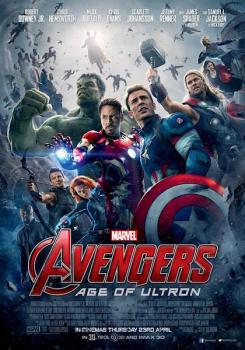 It feels kind of pointless reviewing Avengers: Age of Ultron, the written-and-directed-by Joss Whedon (and, infamously, reshaped-in-the-edit-by committee) follow-up to 2012’s “third most successful film of all time” mega-hit
It feels kind of pointless reviewing Avengers: Age of Ultron, the written-and-directed-by Joss Whedon (and, infamously, reshaped-in-the-edit-by committee) follow-up to 2012’s “third most successful film of all time” mega-hit  Even though the first half of that is still three years away, we’re still very much on the road to it. Heck, we have been practically since the MCU began, thanks to those frickin’ stones (if you don’t know already, don’t expect me to explain it to you), but now it’s overt as well as laid in fan-friendly easter eggs. The titular threat may rise and be put down within the confines of Age of Ultron’s near-two-and-a-half-hour running time, but no such kindness is afforded to the myriad subplots.
Even though the first half of that is still three years away, we’re still very much on the road to it. Heck, we have been practically since the MCU began, thanks to those frickin’ stones (if you don’t know already, don’t expect me to explain it to you), but now it’s overt as well as laid in fan-friendly easter eggs. The titular threat may rise and be put down within the confines of Age of Ultron’s near-two-and-a-half-hour running time, but no such kindness is afforded to the myriad subplots.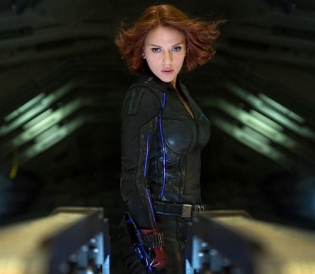 (not just obvious stuff like the Hulk, but digital set extensions, fake location work, even modifying Stark’s normal Audi on a normal road because it was a future model that wasn’t physically built when filming) that stuff they genuinely did for real looks computer generated too. All that time, all that effort, all that epic logistical nightmare stuff like shutting down a capital city’s major roads for several days… and everyone’s going to assume some tech guys did it in an office, because that’s what it looks like. If you’re going to go to so much trouble to do it for real, make sure it still looks real by the time you get to the final cut. I’ll give you one specific example: Black Widow weaving through traffic on a motorbike in Seoul. I thought it was one of the film’s less-polished effects shots. Nope — done for real, and at great difficulty because it’s tough to pull off a fast-moving bike speeding through fast-moving cars. What a waste of effort!
(not just obvious stuff like the Hulk, but digital set extensions, fake location work, even modifying Stark’s normal Audi on a normal road because it was a future model that wasn’t physically built when filming) that stuff they genuinely did for real looks computer generated too. All that time, all that effort, all that epic logistical nightmare stuff like shutting down a capital city’s major roads for several days… and everyone’s going to assume some tech guys did it in an office, because that’s what it looks like. If you’re going to go to so much trouble to do it for real, make sure it still looks real by the time you get to the final cut. I’ll give you one specific example: Black Widow weaving through traffic on a motorbike in Seoul. I thought it was one of the film’s less-polished effects shots. Nope — done for real, and at great difficulty because it’s tough to pull off a fast-moving bike speeding through fast-moving cars. What a waste of effort! The really daft thing is, Whedon specifically added Scarlet Witch and Quicksilver… wait, are Marvel allowed to call them that? I forget. Anyway, Whedon added the Maximoff twins because, as he said himself, “their powers are very visually interesting. One of the problems I had on the first one was everybody basically had punchy powers.” I know Hawkeye’s power is more shoot-y than punchy, and we all know
The really daft thing is, Whedon specifically added Scarlet Witch and Quicksilver… wait, are Marvel allowed to call them that? I forget. Anyway, Whedon added the Maximoff twins because, as he said himself, “their powers are very visually interesting. One of the problems I had on the first one was everybody basically had punchy powers.” I know Hawkeye’s power is more shoot-y than punchy, and we all know 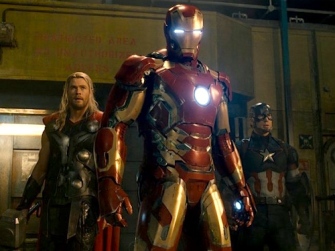 At the end of the day, what does it matter? Age of Ultron isn’t so remarkably good — nor did it go down so remarkably poorly — that it deserves a reevaluation someday. It just is what it is: an overstuffed superhero epic, which has too much to do to be able to compete with its comparatively-simple contributing films on quality grounds, but is entertaining enough as fast-food cinema. Blockbusterdom certainly has worse experiences to offer.
At the end of the day, what does it matter? Age of Ultron isn’t so remarkably good — nor did it go down so remarkably poorly — that it deserves a reevaluation someday. It just is what it is: an overstuffed superhero epic, which has too much to do to be able to compete with its comparatively-simple contributing films on quality grounds, but is entertaining enough as fast-food cinema. Blockbusterdom certainly has worse experiences to offer. The second release in Warner Premiere’s series of direct-to-video DC Universe Animated Original Movies (which now stretches to
The second release in Warner Premiere’s series of direct-to-video DC Universe Animated Original Movies (which now stretches to  However, there are definitely bits that could’ve been sacrificed or abridged further (the Flash’s two early action sequences, for instance) to make more room to tell the story in full.
However, there are definitely bits that could’ve been sacrificed or abridged further (the Flash’s two early action sequences, for instance) to make more room to tell the story in full. I really wanted to like The New Frontier, for all sorts of reasons. It does start well, with moments of promise sparkling here and there, but the longer it spends juggling so many balls, the fewer it can keep flying smoothly. (Do balls “fly” when juggled? Anyway, you get my point.) Considered as a whole, the overall result is fairly disappointing.
I really wanted to like The New Frontier, for all sorts of reasons. It does start well, with moments of promise sparkling here and there, but the longer it spends juggling so many balls, the fewer it can keep flying smoothly. (Do balls “fly” when juggled? Anyway, you get my point.) Considered as a whole, the overall result is fairly disappointing. 2015 Academy Awards
2015 Academy Awards I started the week by reviewing
I started the week by reviewing  In part this is thanks to Keaton, who gives quite an immersive performance as the numbed, self-deluded star. Some people were very much behind him for the Best Actor gong, but I think it found its rightful home: Eddie Redmayne’s performance
In part this is thanks to Keaton, who gives quite an immersive performance as the numbed, self-deluded star. Some people were very much behind him for the Best Actor gong, but I think it found its rightful home: Eddie Redmayne’s performance  Famously, almost the entire film takes place in a single take. A fake one, of course. Well, I say of course —
Famously, almost the entire film takes place in a single take. A fake one, of course. Well, I say of course —  Birdman is an entertaining film, both funny enough to keep the spirits up and dramatic enough to feel there’s some depth there. It’s also a mightily impressive feat of technical moviemaking, but then I do love a long single take (even a fake one). Is it the Best Picture of 2014? Well, from the nominees, it’s not the funniest (
Birdman is an entertaining film, both funny enough to keep the spirits up and dramatic enough to feel there’s some depth there. It’s also a mightily impressive feat of technical moviemaking, but then I do love a long single take (even a fake one). Is it the Best Picture of 2014? Well, from the nominees, it’s not the funniest (